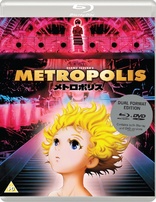Metropolis Blu-ray Movie
HomeMetropolis Blu-ray Movie 
メトロポリス / Metoroporisu / Blu-ray + DVDEureka Entertainment | 2001 | 108 min | Rated BBFC: PG | Mar 13, 2017
Movie rating
7.3 | / 10 |
Blu-ray rating
| Users | 4.0 | |
| Reviewer | 4.0 | |
| Overall | 4.0 |
Overview
Metropolis (2001)
Metropolis is a story of how important emotions are and how they separate humans from everything else. The movie follows a young boy and his uncle (a private investigator). The story is set in the far future where humans and robots live together, unfortunately not in harmony. Many robots are forced underground and are terminated for entering unauthorized areas. They are more or less servants to humankind. The plot starts to unfold when the boy meets a robot named Tima and they get in all kinds of trouble. Never a dull moment when you've got a robot by your side.
Starring: Yuka Imoto, Kei Kobayashi, Koki Okada, Tarō Ishida, Norio WakamotoDirector: Shigeyuki Hayashi
| Foreign | Uncertain |
| Anime | Uncertain |
| Sci-Fi | Uncertain |
| Romance | Uncertain |
| Adventure | Uncertain |
| Drama | Uncertain |
| Crime | Uncertain |
| Action | Uncertain |
| Thriller | Uncertain |
Specifications
Video
Video codec: MPEG-4 AVC
Video resolution: 1080p
Aspect ratio: 1.84:1
Original aspect ratio: 1.85:1
Audio
Japanese: DTS-HD Master Audio 5.1 (48kHz, 24-bit)
Japanese: LPCM 2.0 (48kHz, 24-bit)
English: DTS-HD Master Audio 5.1 (48kHz, 24-bit)
English: LPCM 2.0 (48kHz, 24-bit)
Subtitles
English, English SDH
Discs
Blu-ray Disc
Two-disc set (1 BD, 1 DVD)
DVD copy
Playback
Region free
Review
Rating summary
| Movie | 4.0 | |
| Video | 3.5 | |
| Audio | 4.5 | |
| Extras | 1.5 | |
| Overall | 4.0 |
Metropolis Blu-ray Movie Review
Reviewed by Jeffrey Kauffman May 26, 2019Fritz Lang’s Metropolis remains one of the most iconic films of all time for any number of reasons, but it brings with it a perhaps unstated but still relevant question: “which” Metropolis? By that I mean that, as has been well documented and even preserved in various home media releases, Metropolis has had an almost bewildering number of different versions released in various markets over the course of several decades, and for a long time, it was thought that the “original” version (whatever that might have been) was “lost”. Fans of the film will know that a 16mm reduction negative was ultimately discovered in 2008, something that ultimately led to what was called The Complete ‘Metropolis’ (the link above to the Kino release is of that version), giving fans a chance to see Lang’s original formulation. Almost 25 years earlier, though, one of the “new, improved” (?) versions of the film appeared when famed music producer Giorgio Moroder released Metropolis, a truncated accounting of the film with a (then) contemporary pop score added, with the likes of Freddie Mercury and Pat Benatar providing parts of the song score. Another “alternate” version of Metropolis has, in one way at least, next to nothing to do with Lang’s original film, insofar as Lang’s film is not used in any form for the visual side of things. Instead Lang’s basic premises are presented in an anime form that also adds to and/or subtracts from various elements that were part of the 1927 formulation.
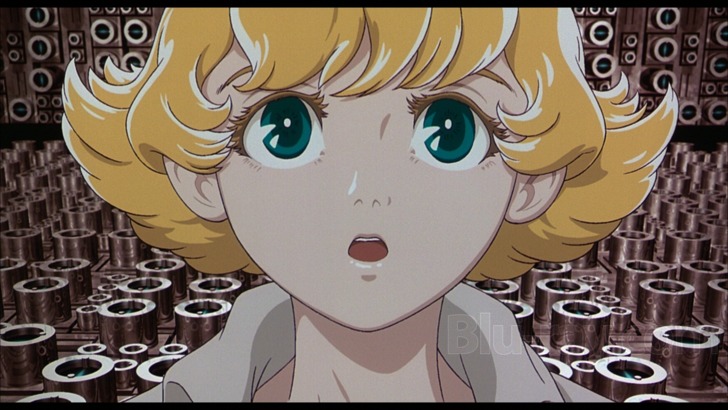
One of the kind of curious things I uncovered as I did some background research in preparation for writing this review was that none other than H.G. Wells wrote rather forcefully, savaging Lang’s Metropolis in a chapter of Wells’ 1928 collection of essays entitled The Way the World is Going. The section devoted to Metropolis is called “The Silliest Film”, which may aptly sum up Wells’ reaction to Lang’s offering, but one of the interesting things that Wells finds objectionable, and something that plays into the anime reworking of Metropolis, is that automation and/or robots could be seen as anything other than helpful to the progress of Mankind. The mere thought that robots might add to the drudgery some humans experience in their lives struck Wells as downright laughable. ( That aspect brings to mind a fantastically funny joke by Conan O’Brien I think may have shared in another review. On Conan’s old show he did what were called “News from the Future” bits — replete with flashlight aimed up under his chin, campfire ghost story style. In one of these segments, he offered what I consider to be a classic line: “In the future, robots will replace humans in dull, repetitive tasks like washing dishes and marrying J. Lo.”)
The dialectic between “helpful” and “harmful” robots does indeed inform quite a bit of this particular Metropolis. A glad handing but nefarious type named Duke Red (who bears a rather uncanny and one suspects intentional resemblance to good old “Uncle Sam”) has helped to elect President Boone, as well as having overseen construction of a massive project known as the Ziggurat. What exactly the Ziggurat is for is something of a mystery (perhaps even to President Boone), though it doesn’t take a rocket scientist to figure out there’s some kind of ulterior motive involved. That ulterior motive seems to include a robot named Tima, which Duke Red has commissioned to be built by a “mad scientist” named Dr. Laughton. Unfortunately for Duke Red, his adopted son Rock gets wind of the project and perhaps due to jealousy takes out Dr. Laughton, setting fire to the lab and supposedly destroying Tima.
In the meantime a detective named Shinsaku Ban and his nephew Kenichi are on the hunt for Laughton, and Kenichi manages to find and rescue Tima as the lab erupts into a massive conflagration. Suffice it to say that a populace unhappy that their employment is being threatened by automation and/or robots starts to rise up, as “family” (adoptive or otherwise) dsyfunctions between Duke Red and Rock also devolve, as Kenichi and Tima (who is initially unaware she’s a robot) try to get back to civilization (or what passes for it), after having fallen into the bowels of Metropolis in the aftermath of the lab explosion. Metropolis is a dense viewing experience on a number of levels, as might be gleaned from even this brief plot summary, and the ins and outs of the various strands of subplots reflect a really impressively nuanced animation style which tends to virtually stuff the frame with visual information.
While Lang’s masterpiece may give a foundational element to Metropolis that can’t be denied, this anime may in fact remind some of another famous anime, one which in fact appeared just a few years after the Giorgio Moroder version of Metropolis, namely Akira. This “resemblance” is due at least in part to a somewhat similar animation style, but the whole post-Apocalyptic ambience as well as a “young ‘un” slowly but surely becoming aware of his or her “particular set of skills” is rather surprisingly alike in both films.
Metropolis Blu-ray Movie, Video Quality 
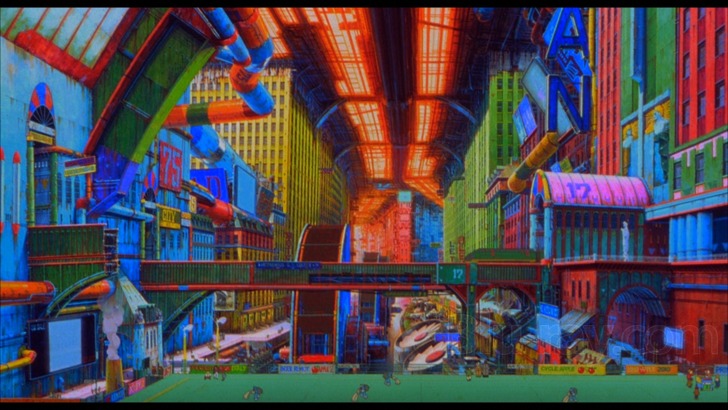
Metropolis is presented on Blu-ray courtesy of Eureka Entertainment with an AVC encoded 1080p transfer in 1.85:1. Metropolis
has had at least a couple of previous DVD releases, and for anyone who has only experienced the film that way, this Blu-ray will provide a noticeable
upgrade, though there are a few issues to mention. The palette is nicely robust throughout the vast bulk of this presentation, though there are
occasional lapses where densities don't look quite as full, and things blanch a bit toward yellows or browns. Grain is fairly heavy throughout the
presentation, and can tend to "roll" in waves through the frame at times, which makes me wonder if this might have been sourced from a secondary
element (Eureka provided no technical data in the press sheet they provided with the release). There are also recurrent if usually minor blemishes,
mostly in
the form of white flecks that perhaps tend to show up so noticeably due to the deeply saturated colors that typically populate the frame.
There's one Member Review already here on this title, and that person mentions "interlacing lines", though I'm frankly not quite sure what that
means.
I saw no signs of stair stepping or combing artifacts (two things I tend to associate with interlaced or even upscaled video), but there are some very
strange anomalies that show up on occasion where what I'd call horizontal "striations" are visible. They come and go and I'm not quite sure what
accounts for them, but they're especially noticeable against brighter backgrounds (there's a very noticeable moment at circa 1:32:37). There is
occasional banding in evidence, and there are some minor
instability issues on some of the rendered material, where line detail can twitch a bit during lateral or vertical pans. The traditional cel animation
can look a bit soft at times, something that can contrast with the more razor sharp looking CGI elements, but there's an appealingly organic
appearance to most of it.
Note: Eureka provided a check disc for purposes of this review, and so while I can't state whether the retail final is the same, this
particular disc was region free and played fine on my Region A equipment.
Metropolis Blu-ray Movie, Audio Quality 
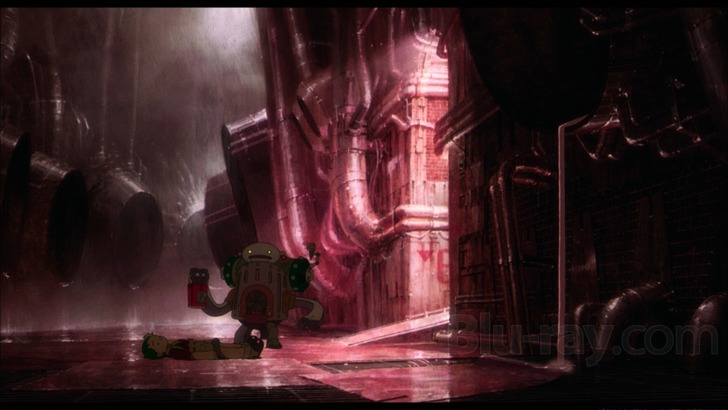
Metropolis features DTS-HD Master Audio 5.1 and LPCM 2.0 options in either English or Japanese. The English surround track is noticeably hotter than the Japanese surround track, but kind of strangely I found Pero in the English language track to be harder to hear, with a soft spoken approach that is at least occasionally slightly buried by effects or score. The film has a glut of great sound effects, including everything from huge explosions to the whir of underground machinery, and the surround channels are consistently engaged. Kind of interestingly, at least given the Morodor revamp of Lang's Metropolis, this film features a kind if Dixieland inflected score, along with some outright jazz standards. In what might be a kind of deliberate sonic call back of sorts, Ray Charles' "I Can't Stop Loving You" is utilized during a huge destruction scene at the end of the film which may remind some of Kubrick's use of "We'll Meet Again" at the climax of Dr. Strangelove or: How I Learned to Stop Worrying and Love the Bomb . Fidelity is fine throughout, and dynamic range is extremely wide.
Metropolis Blu-ray Movie, Special Features and Extras 
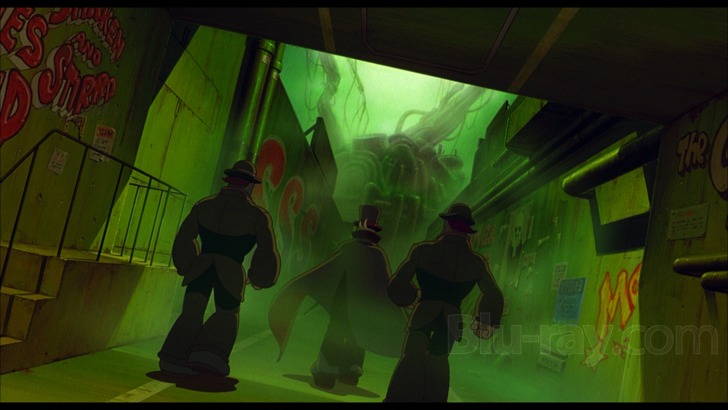
- The Making of Osamu Tezuka's Metropolis (1080i; 33:16) offers some interesting production data and includes some good interviews. In Japanese with English subtitles.
- Filmmaker Interviews (1080i; 8:03) include director Rintaro and writer Katsuhiro Otomo. In Japanese with English subtitles.
- Animation Comparisons come with some explanatory text to use the PopUp Menu button (rather than the more traditional "Angle"
button) to reveal different stages of development in the two following sequences:
- Comparison 1: City View (1080p; 00:41)
- Comparison 2: Wheel Room (1080p; 00:55)
- Trailer (1080i; 1:41)
- Promotional Trailer (1080p; 2:17)
Metropolis Blu-ray Movie, Overall Score and Recommendation 
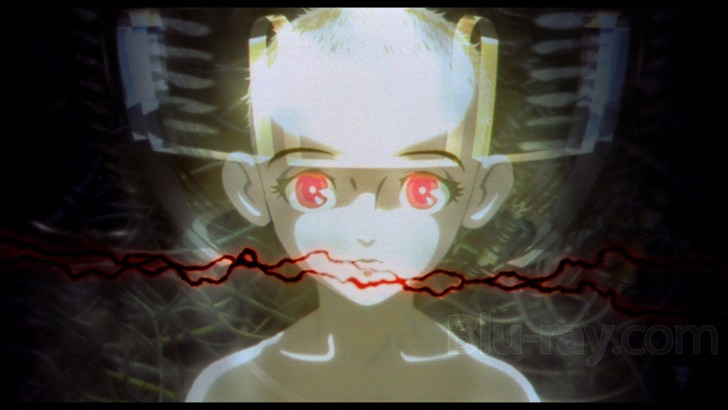
The press sheet Eureka provided with this release may not have included much provenance data, but it did include a little tidbit which caught my eye since it was so overtly provocative. In a trivia section on the press sheet, it's mentioned that original Metropolis manga author Osamu Tezuka wrote and animated a Japanese series called Jangaru Taitei which was then (according to whoever wrote the text on this sheet) "plagiarized by the Disney Company in 1994 and became The Lion King". That may mean that Eureka's legal staff could now be dealing with Disney attorneys (I joke, of course), but in the meantime, the rest of us have a chance to revisit this rather interesting and visually sumptuous "version" of Metropolis. Video encounters a few hurdles, but audio is superb. Recommended.
Similar titles
Similar titles you might also like

Royal Space Force: The Wings of Honnêamise
Collector's Combo-pack / 王立宇宙軍 オネアミスの翼 / Ōritsu Uchūgun: Oneamisu no Tsubasa
1987

Patlabor 2: The Movie
Kidô keisatsu patorebâ: The Movie 2 / 機動警察パトレイバー 2 the Movie
1993

Patlabor The Movie
Kidō Keisatsu Patoreibā Za Mūbī / 機動警察パトレイバー the Movie
1989

Cowboy Bebop: The Movie
2001

Ghost in the Shell 2: Innocence
イノセンス / Inosensu
2004

WXIII: Patlabor the Movie 3
Collector's Edition
2001

FLCL: Complete Collection
2000-2001

Eureka Seven: Part One
2005-2006

Gunbuster
Aim for the Top! Gunbuster
1988-1989

Ghost in the Shell: Stand Alone Complex Complete Series Collection
2002-2005

Outlaw Star: The Complete Series
1998

Casshern Sins: Part 1
2008

Neon Genesis Evangelion: The End of Evangelion
Shin Seiki Evangelion Gekijō-ban The End of Evangelion: Air/Magokoro o, Kimi ni
1997

Redline
2009

Patlabor The Mobile Police: OVA Series 1
The Early Days Collection
1988-1989

Escaflowne: The Movie
2000

Cyber City Oedo 808
Remastered | 電脳都市OEDO 808
1990-1991

Cyberpunk: Edgerunners
SteelBook / サイバーパンク エッジランナーズ
2022

Mobile Suit Gundam: Char's Counterattack
Kidō Senshi Gundam: Gyakushū no Char
1988

Children Who Chase Lost Voices
Hoshi o Ou Kodomo
2011
